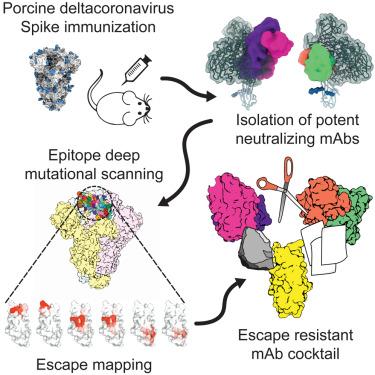Isolation and escape mapping of broadly neutralizing antibodies against emerging delta-coronaviruses
IF 25.5
1区 医学
Q1 IMMUNOLOGY
引用次数: 0
Abstract
Porcine delta-coronavirus (PDCoV) spillovers were recently detected in febrile children, underscoring the recurrent zoonoses of divergent CoVs. To date, no vaccines or specific therapeutics are approved for use in humans against PDCoV. To prepare for possible future PDCoV epidemics, we isolated PDCoV spike (S)-directed monoclonal antibodies (mAbs) from humanized mice and found that two, designated PD33 and PD41, broadly neutralized a panel of PDCoV variants. Cryoelectron microscopy (cryo-EM) structures of PD33 and PD41 in complex with the S receptor-binding domain (RBD) and ectodomain trimer revealed the epitopes recognized by these mAbs, rationalizing their broad inhibitory activity. We show that both mAbs competitively interfere with host aminopeptidase N binding to neutralize PDCoV and used deep-mutational scanning epitope mapping to associate RBD antigenic sites with mAb-mediated neutralization potency. Our results indicate a PD33-PD41 mAb cocktail may heighten the barrier to escape. PD33 and PD41 are candidates for clinical advancement against future PDCoV outbreaks.

针对新出现的δ-冠状病毒的广谱中和抗体的分离和逃逸图谱绘制
最近在发热儿童中发现了猪三角冠状病毒(PDCoV)的外溢,这突显了不同的 CoVs 在人畜间的反复传播。迄今为止,还没有针对 PDCoV 的疫苗或特定疗法获准用于人类。为了应对未来可能出现的 PDCoV 流行病,我们从人源化小鼠体内分离出了 PDCoV 穗状病毒(S)定向单克隆抗体 (mAbs),并发现 PD33 和 PD41 这两种单克隆抗体能广泛中和一系列 PDCoV 变种。PD33 和 PD41 与 S 受体结合域(RBD)和外显子三聚体的冷冻电子显微镜(cryo-EM)结构揭示了这些 mAbs 识别的表位,从而使其广泛的抑制活性更加合理。我们发现这两种 mAb 都能竞争性地干扰宿主氨肽酶 N 的结合,从而中和 PDCoV,并利用深度突变扫描表位图谱将 RBD 抗原位点与 mAb 介导的中和效力联系起来。我们的研究结果表明,PD33-PD41 mAb 鸡尾酒可增强逃逸障碍。PD33 和 PD41 是应对未来 PDCoV 爆发的候选临床药物。
本文章由计算机程序翻译,如有差异,请以英文原文为准。
求助全文
约1分钟内获得全文
求助全文
来源期刊

Immunity
医学-免疫学
CiteScore
49.40
自引率
2.20%
发文量
205
审稿时长
6 months
期刊介绍:
Immunity is a publication that focuses on publishing significant advancements in research related to immunology. We encourage the submission of studies that offer groundbreaking immunological discoveries, whether at the molecular, cellular, or whole organism level. Topics of interest encompass a wide range, such as cancer, infectious diseases, neuroimmunology, autoimmune diseases, allergies, mucosal immunity, metabolic diseases, and homeostasis.
 求助内容:
求助内容: 应助结果提醒方式:
应助结果提醒方式:


